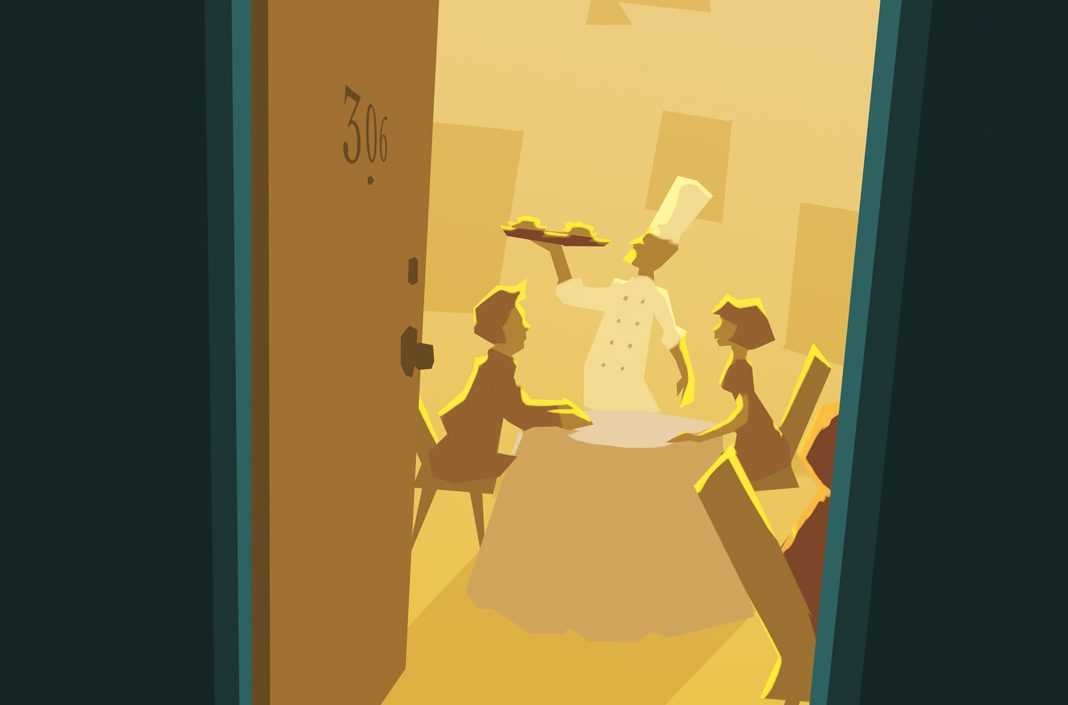Are you sick of greasy dining-hall food but still spending a ton of your time on campus? A handful of pioneering students have cooked up their own solution to this problem.
While college living spaces are not traditionally used to house for-profit food establishments, two undergrads have taken the enterprising step of using their living quarters for more than sleeping and studying. By selling food that they’ve made right in their own kitchens, these culinary entrepreneurs have targeted the large, lucrative demographic of hungry college kids.
Anna Elder, a student at Central Georgia Technical College, is one semester away from completing her core classes a year early. After she finishes her basics, she has plans to apply for the CGTC Nursing Program in fall 2018 for a bachelor’s in nursing. After that, she plans to pursue a doctorate degree to become a neonatal anesthesiologist.
Right now, however, in addition to being a full-time student and having two jobs, Elder is selling her baked goods through her establishment, Itsy Bitsy Delights. Though she specializes in bite-sized desserts, she also makes regular-sized baked goods upon request.
Likewise, Jimmy Wong, a second-year at California Polytechnic State University, San Luis Obispo, is pursuing a major in food science with a concentration in culinary.
Given his area of focus, it should come as no surprise that he recently opened his own pop-up restaurant, DENCH., in his studio apartment at school. Situated right in the comfort of his living quarters, DENCH. offers a high-class restaurant menu made with fresh, in-season ingredients.
Though it might seem odd to sell food that you make in your dorm, Elder and Wong are actually continuing a long tradition of students hawking their culinary creations to pay for tuition.
Insomnia Cookies, for example, began with a student baking cookies in his dorm room and delivering them to his peers; the company now has over 100 locations nationwide, not to mention a bevy of spin-offs.
Plus, the business-plan makes sense: There are few better markets than the college campus, which is traditionally filled with thousands of overworked, time-strapped students and professors.
It doesn’t matter how many dining halls or meal plans a school offers: College students are bound to get bored of cafeteria cuisine sometime after the second week of freshman year.
While Wong always dreamed of opening up his own pop-up restaurant during college, Elder only decided to sell her baked goods after debt became an issue. Despite their different motivations and menu items, both students share a love for cooking that began in their youth and that they plan to continue, professionally or not.
I spoke with the two of them over the phone to pick their brains about food, school, balancing their businesses and what they love to cook for themselves.
Bethany Knickerbocker: When did you get into cooking?
Anna Elder: I remember baking from a very young age. I would always watch my family cooking and I loved the idea of creating new recipes. I grew up in a baking-oriented family. My grandmother used to cater events and my dad would help her. I was very lucky to have a tight-knit family and a stay-at-home mother to teach me how to bake and cook.
Jimmy Wong: Growing up, I always enjoyed eating my mom’s cooking, which spearheaded my interest in food. I would spend my time in her kitchen and constantly ask questions about her food. It wasn’t until high school, though, that I wanted to explore more of the restaurant world.
I began bussing tables at a local Japanese restaurant when I turned 16 and worked my way up the front-of-house ladder to serve tables. I realized that working the front of house wouldn’t exactly grow my cooking abilities, so I emailed a bunch of restaurants in the area asking if I could intern there for a summer.
Luckily enough, the only restaurants that got back to me were the ones with Michelin stars. I spent the summer of my junior year preparing and plating dishes in the pastry kitchens at two different Michelin-starred restaurants, Plumed Horse and Chez TJ. My experiences there solidified my desire to pursue a career in the restaurant industry and my passion for cooking has only grown since.
BK: How did you develop your recipes while making your menu?
AE: A lot of my recipes come from my family or memory of watching family make them. For example, I watched my mother make coffee cake often, so it was embedded in my memory. Some of my recipes have come about through trial and error. I start off with a basic idea and each time I shift it until perfection.
JW: I try my best to work with produce that’s local, organic and sustainable, so my menus are largely driven by what’s in season and available to me here in San Luis Obispo. I’m lucky enough to be in California, where the produce is some of the best you can find in the country.
I create my dishes by first deciding on the flavor profiles I want to work with, then figuring out the components that will correspond with each flavor. I rely a lot on my cookbooks and past experiences in the kitchens I’ve worked in as resources.
BK: At what point did you first decide to monetize your food?
AE: It all started with people I’ve worked with or went to school with. I would always bring desserts to work or school, which led to people asking me to make them some. I didn’t fully start until had no choice, though. In fall 2017, my financial aid failed because I had to transition programs.
They were doing away with their health-care program, so I had to change into interdisciplinary studies. Unfortunately this meant I no longer qualified for the Zale Miller Grant or even half of what I originally did for Pale. I had to get creative and fast. At the time, my serving job only covered my actual bills and maybe a book or two, so I turned to what I knew best: baking.
Itsy Bitsy Delights has allowed me to take the minimum amount of student loans out, pay for my books and afford gas to get me to school.
JW: Coming into college, it was always on my college bucket list to do pop-up dinners. I figured it probably wasn’t the most sustainable thing to do if I was doing it for free, so I knew I needed to charge people for the amount of time and effort I was putting into doing the seven-course meals.
BK: How did you prepare for opening?
AE: I started off by making sure that I had the necessities, a lot of which my family has gotten me over the years. After I gathered my supplies, I began with my marketing. I contacted people that previously tried my desserts to help share the work, I created flyers through Microsoft publisher and I created my page.
This helped me better organize my orders and keep in contact with previous people that purchased baked goods.
JW: After completing a short stage, or apprenticeship, at Lazy Bear in San Francisco this past summer, I quickly decided that I wanted to open up a pop-up restaurant out of the studio apartment I had just moved into back at school. I spent the rest of the summer gathering flatware, glassware, silverware and other various service pieces to use for the pop-up.
I also spent a lot of time researching and figuring out a menu that I wanted to serve. I had to draw a lot on my time cooking for large events at my Asian American Christian Fellowship, as well as my training in the kitchens I worked at. In the end, I settled on a menu that I hoped exemplified who I was.
The menu was and is a collection of my experiences growing up as an Asian American. I try to showcase California cuisine through the lens of my own experiences and cultural heritage. Once I had finished figuring out my food, building my website and designing my menu, I put out my first round of reservations for the school year.
I honestly thought I was literally going to have to beg people to come eat at my place every weekend, but it turned out I was fully booked within a couple of hours. Since then, interest has only grown and people can hardly wait for the next rounds of reservations.
BK: Which menu items are your most popular?
AE: My most popular items would be my strawberry-shortcake cupcakes and all of my cheesecakes. Personally, I like making my new brioche donuts with mango cream filling.
JW: My favorite dish that I serve right now would have to be my dessert course, since I enjoy doing pastry work the best. I serve a scoop of house-made Thai basil ice cream over a bed of meyer lemon curd, meyer lemon gel, micro thai basil and toasted coconut chips.
Over the top of the ice cream is coconut powder and fresh lemon zest. The ice cream is then surrounded by crispy sable tuiles for added texture.
BK: What issues do you run into as a student who sells your cooking?
AE: I have received a lot of negative remarks, such as “You’re not a real business” and “Maybe if you’d work you could pay for school.” The reality is that college costs money no matter how good of grades you get. Anybody that goes to school with me or has worked with me knows that I work hard for what I need.
My two jobs pay my bills, but I can’t work too much on the weekdays because I’m in school from 8–5. Even working two jobs and baking doesn’t mean I don’t do without some months.
JW: There is always a fear that I might get evicted or fined for what I’m doing, but so far that hasn’t been an issue (fingers crossed). I think other than that, the biggest challenge for me would definitely be cooking a seven-course meal out of my tiny kitchen.
BK: How did you come up with the name for your restaurant, DENCH.?
JW: Back in high school, my friends and I followed an English soccer player named Emmanuel Frimpong, who played for Arsenal. One of his catch phrases was “dench,” inspired by his affection for Judi Dench, the beloved British actress. Frimpong would use “dench” as a way to say things were “wicked” or “cool.”
My friends and I thought it was funny so we started to say it too, and it kind of just stuck with me. Nowadays, if you go on #dench on Instagram, you’ll see a ton of buff British dudes and sometimes my food.
BK: What do your future plans look like?
AE: I believe that I will always bake and cook. It is something I enjoy and couldn’t imagine giving up. I would love to eventually be the house that my big family comes to for holidays and I make everything from scratch. It’s a part of me that I would love to continue to share with others as long as I am capable of doing so.
JW: In the long term, I hope to eventually open up my own restaurant. But in the meantime, I’m looking forward to to cooking in restaurants and traveling to build my repertoire and gain more experiences that I can draw from when creating more food.
Follow Itsy Bitsy Delights on Facebook and DENCH. on Instagram at @jwongdynasty.

















